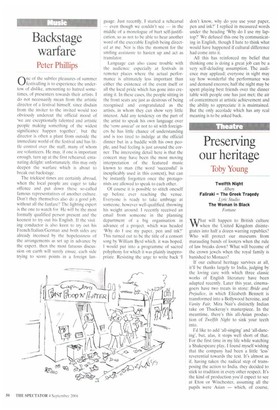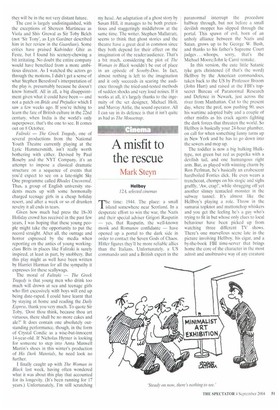Preserving our heritage
Toby Young
Twelfth Night Albeiy Faliraki — The Greek Tragedy Lyric Studio The Woman in Black Fortune
What will happen to British culture when the United Kingdom disintegrates into half a dozen warring republics? Who will protect our museums from marauding bands of looters when the rule of law breaks down? What will become of the crown jewels when the royal family is banished to Monaco?
If our cultural heritage survives at all, it'll be thanks largely to India, judging by the loving care with which three classic works of English literature have been adapted recently. Later this year, cinemagoers have two treats in store: Bride and Prejudice, in which Elizabeth Bennett is transformed into a I3ollywood heroine, and Vanity Fair, Mira Nair's distinctly Indian take on Thackeray's masterpiece. In the meantime, there's this all-Asian production of Twelfth Night to sink your teeth into.
I'd like to add 'all-singing' and 'all-dancing', but, alas, it stops well short of that. For the first time in my life while watching a Shakespeare play, I found myself wishing that the company had been a little 'less' reverential towards the text. It's almost as if, having taken the radical step of transposing the action to India, they decided to stick to tradition in every other respect. It's the kind of production you'd expect to see at Eton or Winchester, assuming all the pupils were Asian — which, of course. they will be in the not very distant future.
The cast is largely undistinguished, with the exceptions of Shereen Martineau as Viola and Shiv Grewal as Sir Toby Belch (not 'Sir Tony', as Lyn Gardner described him in her review in the Guardian). Some critics have praised Kulvinder Ghir as Feste, but I found his scenery-chewing a bit irritating. No doubt the entire company would have benefited from a more ambitious director. As I watched the actors go through the motions, I didn't get a sense of what Stephen Beresford's interpretation of the play is, presumably because he doesn't know himself. All in all, a big disappointment given what it could have been — and not a patch on Bride and Prejudice which I saw a few weeks ago. If you're itching to learn the fate of British culture in the 22nd century, when India is the world's only superpower, that's the one to see. It comes out on 8 October.
Faliraki — The Greek Tragedy, one of several productions from the National Youth Theatre currently playing at the Lyric Hammersmith, isn't really worth bothering with either. Devised by Paul Roseby and the NYT Company, it's an attempt to impose a classical dramatic structure on a sequence of events that you'd expect to see on a late-night Sky One programme called Rhodes Uncovered. Thus, a group of English university students meets up with some hormonally charged teenage girls in a cheap holiday resort, and after a week or so of drunken revelry it all ends in tears.
Given how much had press the 18-30 Holiday crowd has received in the past few years, I was hoping that these young people might take the opportunity to put the record straight. After all, the outrage and horror expressed by the media when reporting on the antics of young workingclass Brits in places like Faliraki is surely inspired, at least in part, by snobbery. But this play might as well have been written by Harriet Harman for all the sympathy it expresses for these scallywags.
The moral of Faliraki — The Greek Tragedy is that young men who drink too much will drown at sea and teenage girls who flirt excessively with boys will end up being date-raped. I could have learnt that by staying at home and reading the Daily Express, thank you very much. To quote Sir Toby, `Dost thou think, because thou art virtuous, there shall be no more cakes and ale?' It does contain one absolutely outstanding performance, though, in the form of Crystal Condie as a wise-but-innocent 14-year-old. If Nicholas Hytner is looking for someone to step into Anna Maxwell Martin's shoes in this winter's production of His Dark Materials, he need look no further.
I finally caught up with The Woman in Black last week, having often wondered what it was about this play that accounted for its longevity. (It's been running for 17 years.) Unfortunately, I'm still scratching
my head. An adaptation of a ghost story by Susan Hill, it manages to be both pretentious and staggeringly middlebrow at the same time. The writer, Stephen Mallatratt, seems to think that ghost stories and the theatre have a great deal in common since they both depend for their effect on the imagination of the reader/audience. That's a bit much, considering the plot of The Woman in Black wouldn't be out of place in an episode of Scooby-Doo. In fact, almost nothing is left to the imagination and it only succeeds in scaring the audience through the tried-and-tested methods of sudden shocks and very loud noises. If it works at all, it's largely thanks to the ingenuity of the set designer, Michael Holt, and Murray Airlie, the sound operator. All I can say in its defence is that it isn't quite as bad as The Mousetrap.



































































 Previous page
Previous page